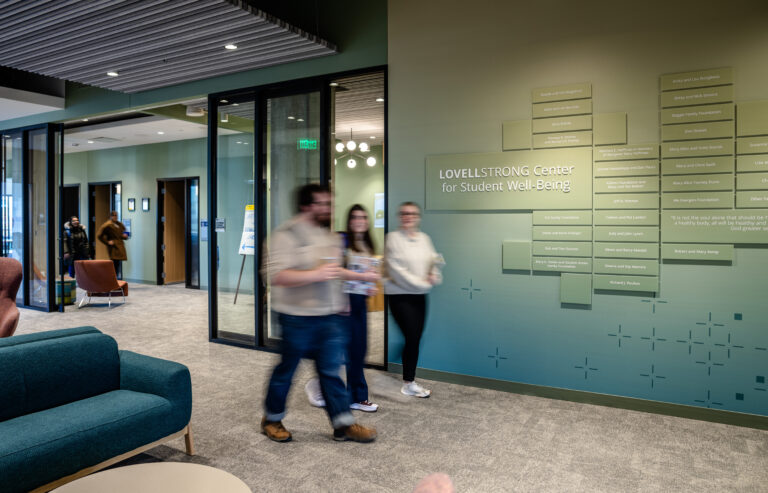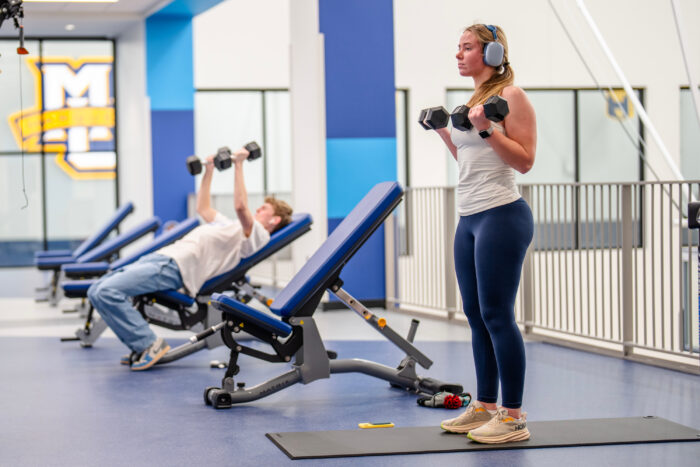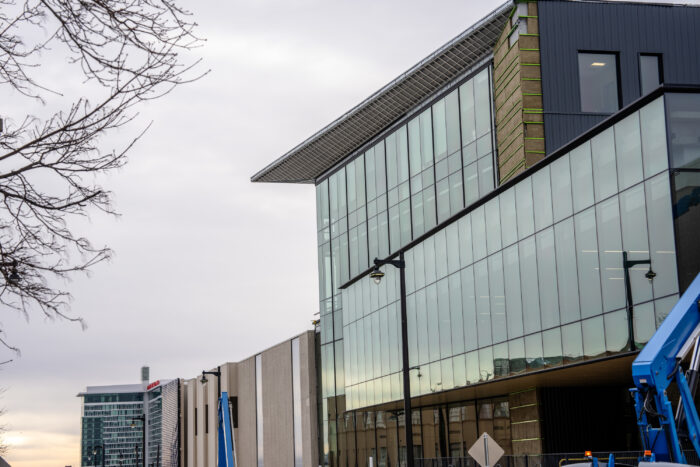Every school year between October and February, a team of about 25 counselors in the Office of Undergraduate Admissions diligently reviews and assesses applications from high school students before sending decisions. Last year, the team read 18,701 applications for the fall 2024 class.
A critical component of every application is the essay.
“The admissions essay is integral to the application process because it gives us a window into a student’s personality that we can’t know through transcripts and GPAs,” says Rose Howard, associate director of admissions marketing and communications.
Essays run the gamut of topics, such as academic and athletic achievements, faith and family, or overcoming adversity. Amid this year’s review process, we asked admissions counselors about notable trends in essay topics from the incoming fall 2025 class.
Mental health and wellness have become leading essay topics
Howard, who has been a counselor since 2016, has noticed a significant rise in the number of essays about mental health — as well as physical well-being — over the past few application cycles.
“When I first started reading files, we didn’t really see students talking about their mental health. We would see it here and there,” Howard says. “Now I would estimate that there’s something related to mental health in one in every three essays we see.”
Since the COVID-19 pandemic, more students have been willing to discuss mental health topics, says Erin Gannon, dean of students in the Division of Belonging and Student Affairs.
“Kids in K-12 who were learning remotely full time are now young adults coming to college,” Gannon says. “By and large, our students now have benefited from a lot more conversation about mental health. Some of that was happening before COVID, but I think it took off in the pandemic when we almost universally said, ‘There’s no shame in talking about mental health.’”
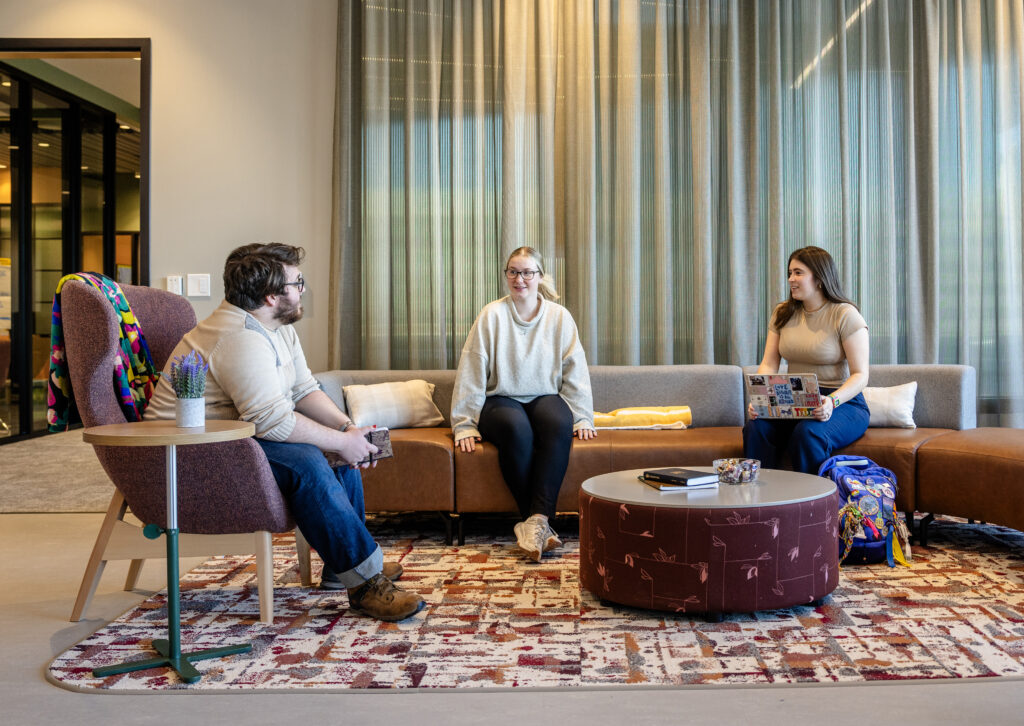
Gannon’s office runs the CARE (Campus Assessment Response and Education) Team, one of many campus resources for students experiencing emotional distress. Students can also access the new Wellness + Helfaer Recreation facility, which houses the Counseling Center, the Marquette University Medical Clinic, the Center for Student Wellness and Health Promotion, and Campus Recreation.
“I am excited to see students engage in this new space with the range of services that are available to them,” says Brenda Lenz, director of the Counseling Center. “I am also excited to collaborate more closely with the professionals from the wellness units to envision how we can engage at all the intersections of our work: health promotion, prevention, outreach, early intervention, treatment and recovery.”
Students seek belonging through friendship, involvement
Students often write about hometown experiences or acts of service to show connections to their communities. But, once admitted to Marquette, some express concerns to counselors about carving out a role in the campus community.
“Whether you’re a first-year student, a transfer student or a graduate student, everyone is looking to find their place at Marquette,” says Catie Koruba, assistant director for transfer admissions. “A big part of Marquette’s identity is its strength in community — that sense of belonging — and trying to find your purpose.”
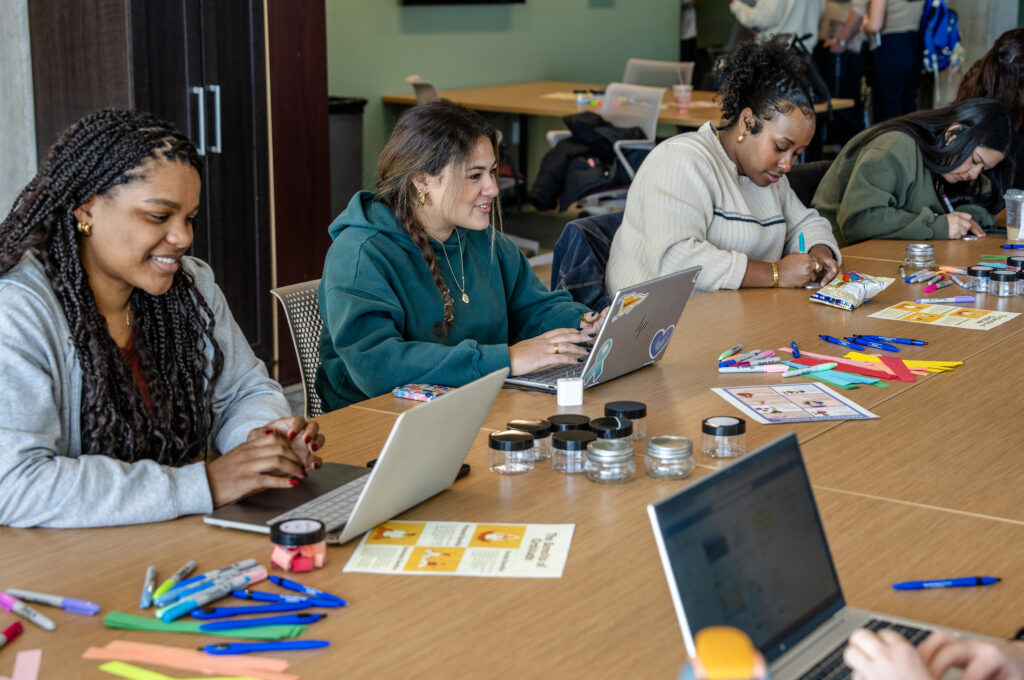
Gannon says it’s common for students to take time to find their place after they arrive on campus, but it should only encourage them to make adjustments.
“You may need to change your major; you may need to change your residence hall; you may decide that you don’t actually love basketball, and you really love martial arts instead,” Gannon says. “One of my objectives is to try to set expectations for students. If you feel you made a wrong decision because you haven’t met your people and it’s November of your first semester, there are more people like you than there are people who found their circle in the first few months.”
Gannon emphasizes that “the Marquette experience” doesn’t come naturally to everyone when they enroll, and physical spaces such as the Lemonis Center for Student Success and the Wellness + Helfaer Recreation facility provide room to find that sense of belonging.
“My hope is that the new [Wellness + Helfaer Recreation] facility offers a place where students can go to be in community with one another in a variety of ways, but also to attend to their own well-roundedness and well-being across their physical health, their mental health, their emotional health and their social health,” Gannon says.
Interest in leadership is high, but leadership is more than a title
Among the more common essay themes annually, says senior admissions counselor Maddie Ramion, is leadership — in sports and clubs, part-time jobs or other extracurricular activities.
“Those are fun ones to read because you kind of envision how they’ll be a leader at Marquette,” Ramion says.
Students in our program have to un-learn that leadership isn’t about being the star — it’s about getting the best out of a group of people.
Kate Trevey, Nana Fotsch Director of the Fotsch Innovation and Engineering Leadership Development (FIELD) Center and E-Lead director
As Ramion explains, it’s not always traditional leadership positions she envisions for students. She recommends the Excellence in Leadership (E-Lead) program and the 707 Hub to students who show in interest in problem solving and experiential learning.
“Students see themselves as leaders because they’ve had the time to establish themselves as team captains and club presidents and peer leaders in high school,” Ramion says. “But leadership at Marquette can have a lot of different meanings. It’s understanding that just because you’re not a president of a club at Marquette doesn’t mean that you can’t be a leader in different ways.”
E-Lead, for example, develops students’ capacity to grow into the leaders they want to become, says Kate Trevey, Nana Fotsch Director of the Fotsch Innovation and Engineering Leadership Development (FIELD) Center and E-Lead director. The program teaches students how to engage effectively with others and how to lead innovation for the greater good, which sets them up well for life and career success.
“Students in our program have to un-learn that leadership isn’t about being the star — it’s about getting the best out of a group of people,” Trevey says.
The three-year program accepts roughly 40 applicants per class from any major. Unlike other curriculum-based programs, Trevey says E-Lead doesn’t select solely on resume material or previous leadership experience.
“If a student has a strong desire to grow and develop their capacity as a leader, we consider them,” she says. “One of the amazing promises of a Marquette education is that we’re holistically helping students become the best version of who they can be so they can go Be The Difference. So, it’s not just, ‘Come and get a degree so that you can pursue a career.’ It’s learning the principle of ‘care for the whole person’ and appreciating the dignity of others. That’s how we think about developing leaders who are going to go out and make a difference and change the world.”
